Closing the Gap on K-12 Accommodations

Closing the Gap on K-12 Accommodations
by Caroline Moassessi, FAACT Vice President of Community Relations
Leaving your K-12 child in the care of a school district can be one of the most complex parts of raising a child with food allergies. Nothing can replace the importance of effective food allergy accommodations. Schools must trust parents/caregivers to share up-to-date information about their students, provide emergency epinephrine, and partner with the school. At the same time, parents/caregivers need to rely on schools to carry out accommodation plans.
January’s return to school is the perfect time to check in on your school relationship and review your child’s accommodation plans. Make an appointment to discuss accommodation progress, make adjustments if needed, and continue developing your relationship with school staff and administrators. Open communication and respectful conversations are the backbone of successful food allergy accommodations.
Be honest with your observations and feedback yet also a great listener to understand better what is working or not working for the school and why. A few years ago, a FAACT family learned that school district staff were unsure how to manage scared parents/caregivers—they could see the fear but didn’t know how to address it, which created a barrier to honest and productive communication. After discussing these challenges with a few food allergy families, staff realized that creating a general food allergy management policy for the district would offer an essential road map to help guide accommodation meetings and conversations.
Sometimes, teachers and school staff don’t have access to medically vetted food allergy education—but think they do! Listen to what teachers and staff say in your meetings. Listen to your student. Listening will show you areas where staff need better education and where your student’s accommodations may need to be revised.
FAACT developed medically reviewed and vetted materials on a comprehensive range of school-related topics to help families, school staff, and administrators successfully navigate accommodations, including basic food allergy information, management of students, bullying, and classroom activities. If you believe your school needs more food allergy education, we invite you to visit FAACT’s Schools and College Center to explore resources for school personnel and staff, including free downloads. Share essential links from this Center to help school staff find food allergy education easily and quickly.
If you believe your student’s accommodations need to be revised, visit FAACT’s Accommodations Center. Materials in the Center cover topics including Section 504 plans, IEP, IHCP, legal rights, and suggestions on approaching accommodation meetings.
Go into meetings equipped with FAACT’s educational materials and an open mind, ready to listen and solve instead of fighting and defending. Sometimes you need to get assertive, but educating yourself and those around you is critical to conversations about your student’s unique needs at school.
Although managing food allergies in the school environment is a challenge, millions of food-allergic students successfully attend school daily. Staying focused on communication, sharing medically and legally vetted information, and being a great listener can help you and your family tackle any accommodation challenge and pave the way to success! Schedule your mid-year accommodation to review the year to date and help you plan for next year’s accommodations.

